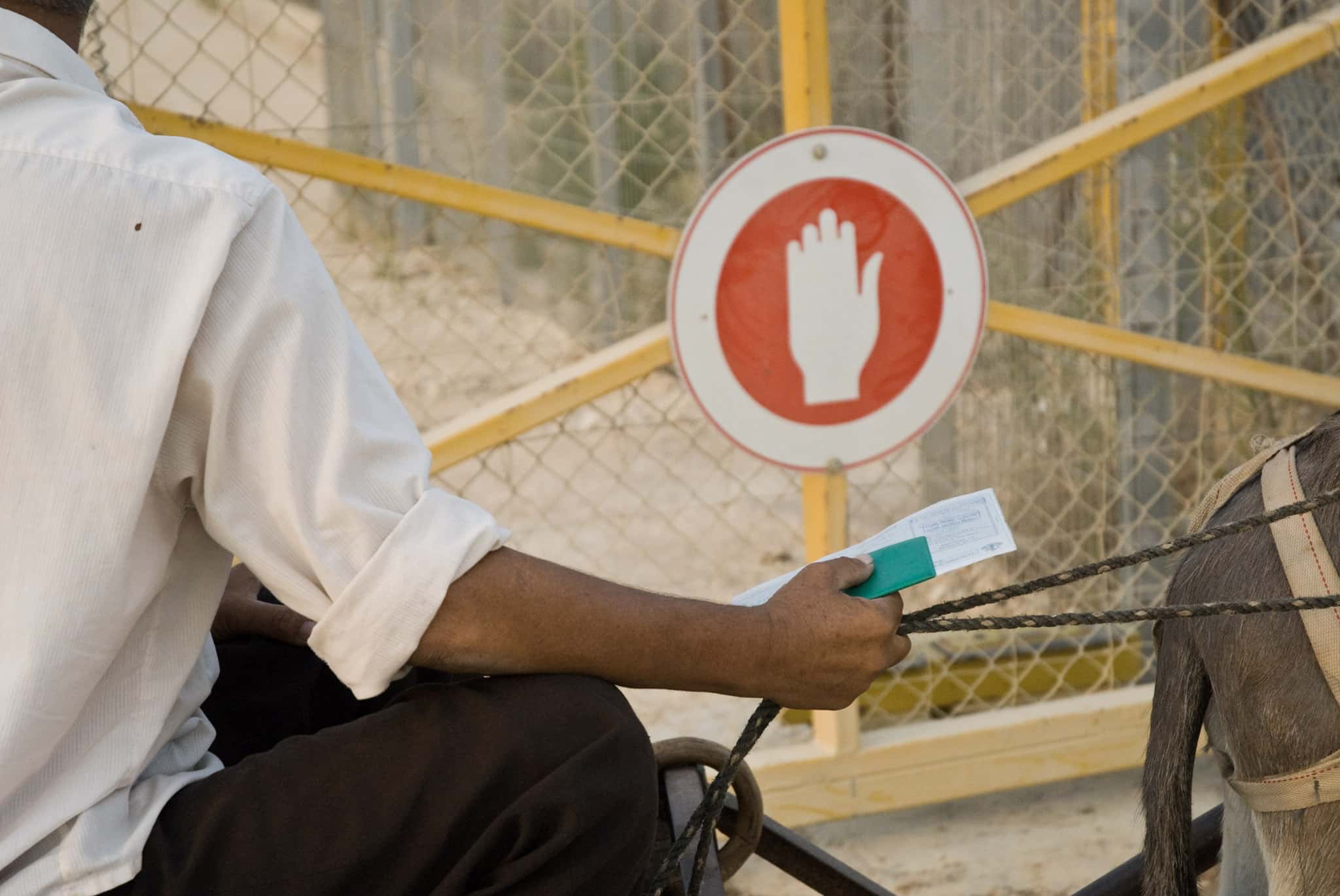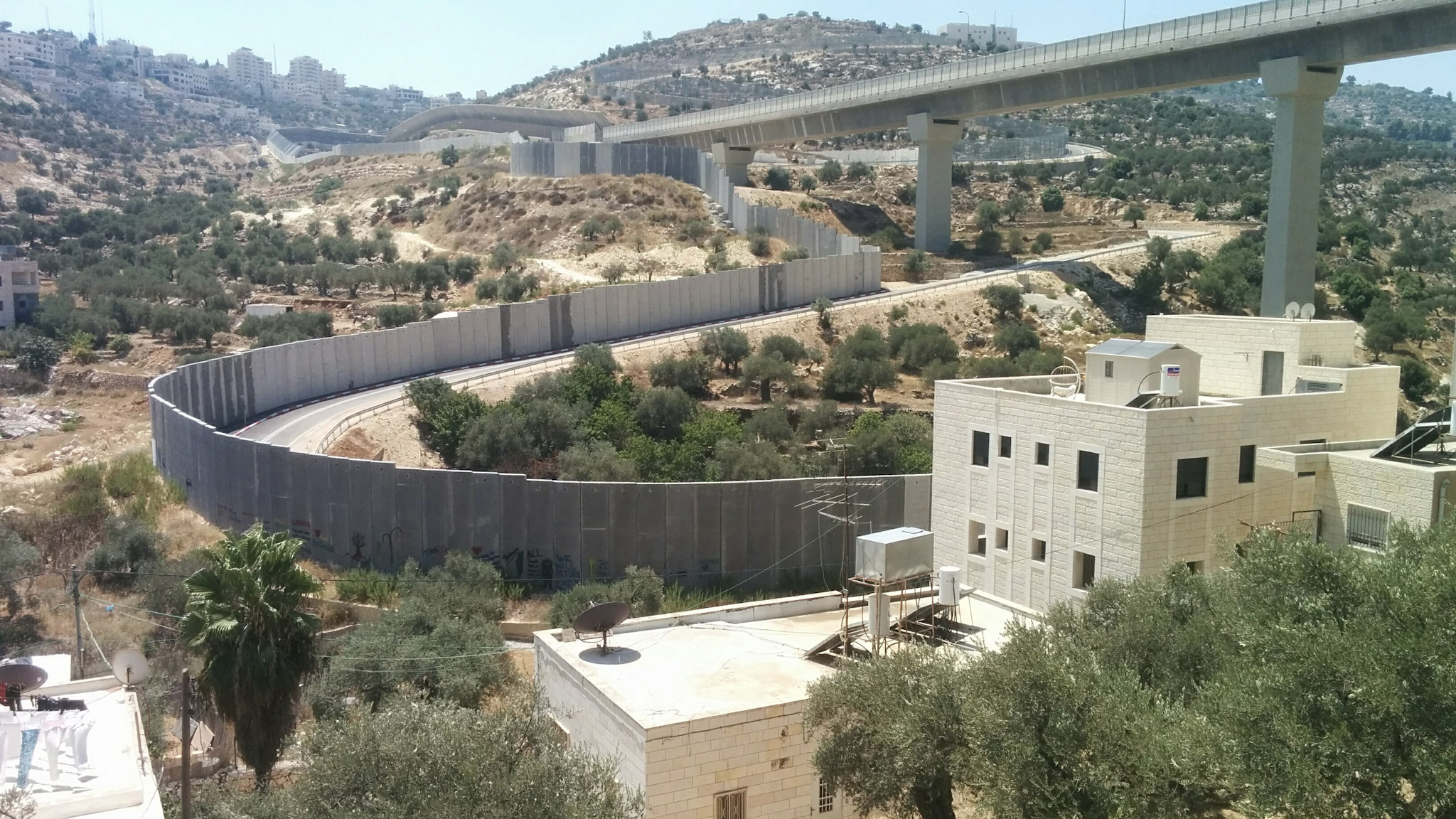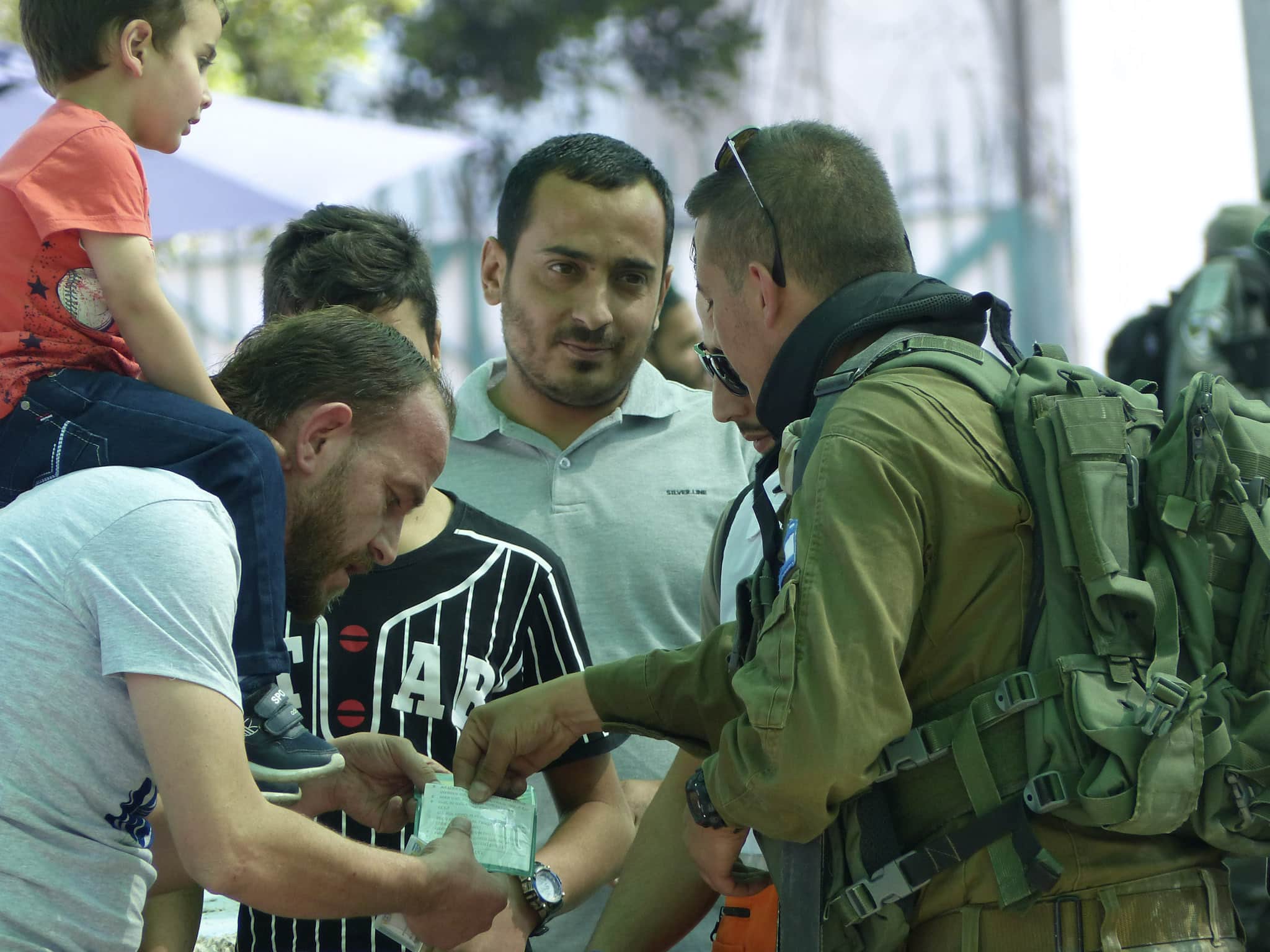Do you need a pint of milk, need to go to the doctor or give birth, go to work, go to worship, farm your land, attend a family funeral or wedding?
Can you imagine needing a colour coded permit to move between Hackney and Greenwich, Belfast and Lisburn, Glasgow and Motherwell, or Cardiff and Swansea?
Having the freedom to move about and do all the things we take for granted is not available to Palestinians. Their freedom of movement is severely curtailed by what Israeli human rights organisation, Machsom Watch, call a ‘bureaucratic maze‘ put in place by the Israeli authorities. A major aspect of this maze is the permit system.
‘In 2003 Israel instated a regime of permits defining all the kinds of permits needed by Palestinians when they leave their home and move around inside the occupied territories and into Israel… It is an apparatus that consists almost entirely of sweeping restrictions that impact thousands of innocent Palestinians superfluously, people who are not involved in any part of the struggle against Israel.’

A Palestinian waiting with his permit to access his fields which have been gated by the Israeli authorities
Nawal from An Nabi Samwill, a small village on the outskirts of West Jerusalem surrounded by the separation barrier told us that he has to apply for a permit to go food shopping. Nawal lives just 9 kilometres from the centre of East Jerusalem but as the barrier separates him from the city, he needs to apply for a permit to bring food through the checkpoint.
‘When will all this stop… Freedom to live a simple life and support my family is all that I want and need.‘

The separation barrier separates many Palestinians from their land, livelihoods, and other essential services

Palestinians have to pass through Israeli military guarded checkpoints like this. Queues and delays are common.
Ibtisam, from Al Jabal in the West Bank, spoke to us about the uncertainty that women face. Her sister went into early labour and had to reach the hospital in Jerusalem. She was waiting at the checkpoint for over two hours before Israeli soldiers let her through. She did not need a permit on that occasion as it was an emergency, however only her mother was allowed to accompany her. Her mother told us;
‘In what other civilised society do they prevent women from accessing medical help during labour. I was so scared that I would lose both of them. Thankfully both are safe, and sound and he is just like his dad.‘
The permit system applies only to Palestinians in the West Bank and Gaza Strip. It does not apply to Jewish settlers, other Israeli citizens or foreign nationals, who generally move freely within the West Bank and between the West Bank and Israel.
Machsom Watch estimate that there are around 105 types of permits that Palestinians have to navigate to go about their daily lives.
Every time Palestinians wish to travel between the West Bank, and East Jerusalem (which Israel has annexed as part of its territory in violation of international law) or Israel they must obtain a personal permit. The permits are valid for a fixed period and can range from a single day to two years. Permits must be continuously renewed before they expire.
There are two types coloured coded ID system for Palestinians – green and blue.

Green ID:
Palestinians in the West Bank hold green ID cards that are issued by the Palestinian Authority (PA). They are considered Palestinian citizens. Despite the fact that it is issued by the PA to Palestinian citizens, the information of the ID has to be shared and registered by the Israeli authorities, otherwise its not valid.
Palestinians with green ID cards who want to travel to Jerusalem or Israel they will need a permit to cross the many checkpoints that have been established.
Amir and Mariam live in Hizma and both have green ID cards.
Mariam has cancer and needs to visit the clinic regularly for specialised treatment in Jerusalem. Not only do they need to apply for a permit at least ten working days in advance but they need to leave their house at 6am to ensure that the checkpoints that they have to travel though are opened, even though they only live 10 kilometres away.
‘They have stripped me of my dignity as all my medical notes and documents have to be shared with the Israeli Intelligence Agency and they decide whether or not I can attend.‘
Miriam
‘Having cancer is stressful enough but the added stress and uncertainty of applying for a permit is taking its toll on my wife. It’s a nightmare.‘
Amir

Israeli soldiers check Palestinian permits
Blue ID:
Palestinians who live in Jerusalem hold a blue ID which is solely issued by the Israeli authorities. Although they have greater freedom of movement than Palestinians with green ID’s, they are not citizens of the State of Israel, but rather ‘permanent residents.’
There are a number of regulations permitting the Israeli authorities to remove permanent residency status from Palestinians. For instance if a person works in a different part of the West Bank or wants to live with a spouse from a different part of the West Bank.
Even for those who have ‘residency’ this status does not afford the same citizenship rights that Israelis have and maintaining residency is a challenge. Palestinians need to abide by a complex system, regularly submitting documents such as rent contracts, salary slips, electric and water bills, and tax payments to prove their residency and connection to the city.
Proof of residency in Jerusalem is an ongoing requirement for Palestinians to maintain the right to reside in the city and is monitored by the Israeli National Insurance Institute (NII). The Israeli Ministry of Interior relies on the NII to provide evidence that any particular Palestinian is actually living in the city. The NII send their investigators to the neighbourhoods and homes of Jerusalem residents to check whether indeed they reside in the city. A local with a blue ID shared with us;
‘This is really stressful as you have no idea when they will come.‘
According to Israeli human rights organisation, Hamoked;
‘The permit regime contradicts many tenets of Israeli and international law and its implementation by the military denies Palestinians the possibility of leading normal lives. The permit regime constitutes collective punishment and violates Palestinians’ right to freedom of movement in general, and the right to travel freely within their own country in particular. The impingement on the right to freedom of movement leads to other human rights violations including the rights to family life, health, education, property, a livelihood, culture and community life, all accompanied by a severe violation of the right to equality and dignity.’
In July 2024, the world’s highest court, the International Court of Justice (ICJ), advised that Israel’s occupation of all Palestinian territory, including the the cutailment of freedom of movement through the checkpoint and permit regime, is illegal and must end. Please find our urgent actions below and join us in calling on elected representatives and faith leaders to honour the findings of the court.
Take action!
-
Sign and share our urgent action on the ICJ’s Palestine ruling! In the UK? Sign here. In Ireland? Sign here.
-
Israel has passed a law, which will make it extremely difficult for the Palestinian refugee agency UNRWA to deliver its life-saving services at a time of immense need. Sign and share our urgent action to protect UNRWA. In the UK? Sign here. In Ireland? Sign here.
-
Israel’s expanding military campaign is having catastrophic consequences for people in Palestine and Lebanon. Donate to the Disaster Emergency Committee (DEC) humanitarian appeal here. Can’t donate? Can you share with your friends and family?
What does international law say?

